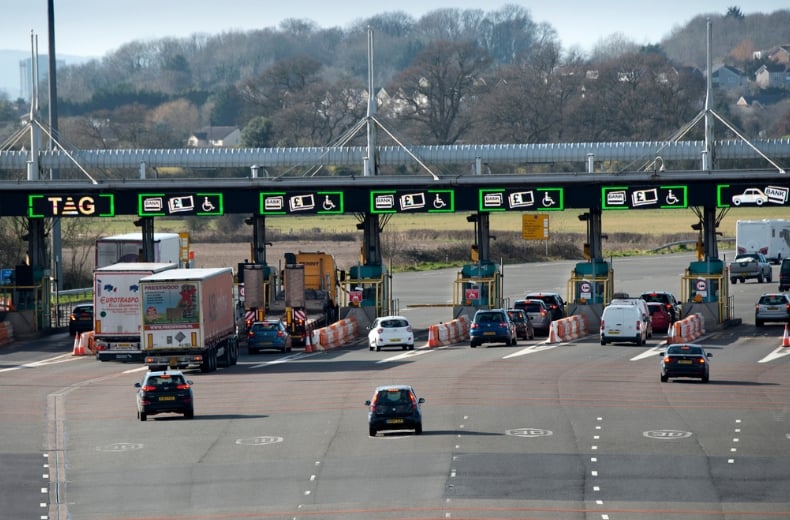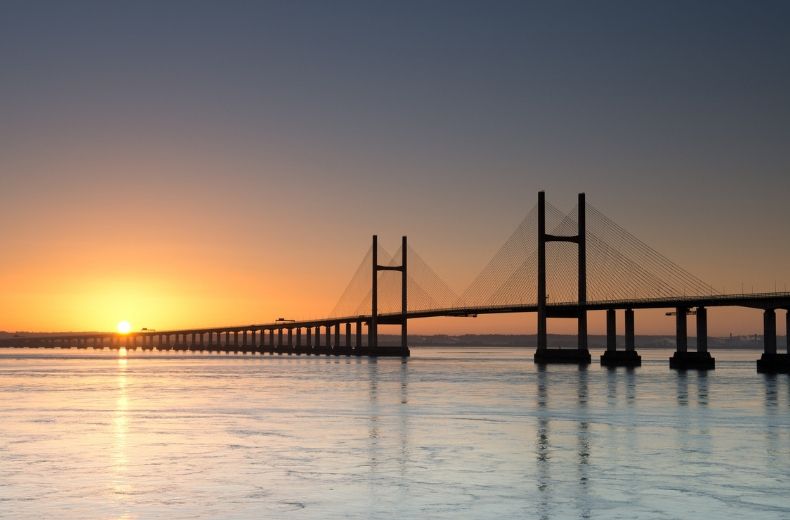But in October 2018, following more than 50 years of tolls being imposed on motorists crossing the Severn, Welsh Secretary Alun Cairns announced government plans to scrap the charge.
To help you understand what’s going on, here’s our guide to everything you need to know about the Severn Crossing, and what to expect now that the charge is abolished.
What is the Severn Crossing?
The Severn Crossing is actually two separate crossings formed by bridges that span the River Severn, connecting Gloucestershire in England and Monmouthshire in Wales.
The first of these was the Severn Bridge, a suspension bridge located south of Chepstow that opened in 1966. The bridge originally formed part of the M4 until the motorway was relocated in 1996 and the road renamed the M48.
The Second Severn Crossing — officially called the Prince of Wales Bridge — is a cable-stayed bridge located to the south of the original Severn Bridge. Since it opened in 1996, the bridge has formed part of the M4 that connects England and Wales.
READ MORE: A guide to UK toll roads and bridges & susension repair
Is the Severn Crossing free?
Yes, after 52 years, the charge was scrapped on December 17th 2018.
The Severn Crossing toll was the charge levied on motorists crossing westbound on both the Severn Bridge and the Prince of Wales Bridge, in place since their respective openings to help cover construction and maintenance costs.
The charge was the same on both bridges and applied only to motorists heading westbound into Wales; there was no charge for motorists heading east into England. Toll charges were based on a three-tier pricing system with some road users, including motorcyclists, exempt from the charge.
When did the Severn Bridge toll end?

Cairns announced that the Severn crossing toll would be abolished on both the M48 Severn Bridge and the M4 Prince of Wales Bridge from 17th December 2018.
The move followed a period of intense speculation on the future of the toll since the bridges were brought back into public ownership in January 2018. This change of ownership coincided with a slight reduction in price, which came into effect on 1st January 2018.

SALE – up to 40% off*
Roadside & Recovery from £5.29 a month*
• Cheaper than AA Price Promise or we’ll beat by 20%^
• We get to most breakdowns in 60 mins or less
• Our patrols fix 4/5 breakdowns on the spot

Why was the Severn Bridge toll scrapped?
That depends on who you speak to.
The government argued that the tolls were being scrapped to provide a much-needed economic boost to the South Wales and Bristol-Bath regions and help mitigate against the impact of Brexit.
However, many motorists who used the bridges regularly believed that they were being ripped off by toll charges for years, and that if the tolls were enforced to cover the costs of the bridges then they should have been abolished for years already.
Speaking after news of the toll being scrapped broke Nicholas Lyes, RAC head of roads policy, said: "Many would argue that this should have happened years ago, but it will be welcomed by all motorists who use the crossing daily which can add up to annual bills in excess of £1,000 for a car. Business drivers, holiday makers and commuters will have endured significant delays at the pay booths over the years.”
What are the benefits of abolishing the Severn Crossing toll?
Announcing the move, Cairns claimed that scrapping the toll would boost the Welsh economy and open the principality up to greater levels of investment.
He said: “My number one aim when I became Secretary of State for Wales was to do away with tolling that for half a century has restricted and distorted the growth and connections of the Welsh economy.”
Local business leaders have largely welcomed the news. Phil Smith, managing director of Business West told Bristol Live that: “We are in favour of the decision to scrap the Severn Bridge toll as we feel that a psychological barrier has been lifted, which will help facilitate deeper economic relations between South Wales and Gloucestershire.”
Abolishing the toll will save commuters an annual toll charge of £1,456, while holidaymakers and businesses will also welcome the move which Cairns described as “an early Christmas present for hard-working commuters.”
It is anticipated that this will lead to rising house prices across the region, particularly on the Welsh side of the border, as workers take advantage of cheaper journeys to look further afield for viable commuter options for Bristol.
What are the disadvantages of abolishing the Severn crossing toll?
More than a million trips are currently made over the two Severn crossings every month, and Department for Transport (DfT) modelling estimates that removing the tolls will see this figure increase by 17% above the already predicted increase in traffic.
There are growing concerns among local businesses and residents that this will significantly increase congestion in the surrounding area and put a strain on existing infrastructure, particularly around Newport in Monmouthshire and the M4/M5 junction near Bristol, already one of the country’s busiest interchanges.
DfT modelling also predicts that scrapping the tolls will lead to an extra 16,000 daily car journeys in Bristol, a figure that local business leaders say will cause ‘gridlock’ and have serious air pollution implications.
Ann O’Driscoll, director of North Bristol SusCom, which promotes sustainable transport in the city, told Bristol Live: “Removing the tolls entirely could mean even more of an increase [in traffic] and that would lead to diabolical traffic during peak hours.”
“People are excited to save all this money but they haven’t improved buses or trains – it is really poor planning. The Government has been oblivious to the implications. I agree there will be positives in this but not if everyone is stuck in traffic.”
SEE ALSO: Road trips in Wales — six of the best Welsh drives
Can you cycle across the Severn Crossing?
If you don’t fancy driving across the Severn Crossing at all, then there is some good news — it is possible to walk and cycle across the river on the M48 Severn Bridge. However, neither pedestrians or cyclists are allowed to use the M4 Prince of Wales bridge.
Want to protect yourself against any losses after an accident? Get legal expenses insurance for just £15 a year with RAC Legal Care Plus.
Did you know, you can get fined for moving out of the way of an ambulance?
Want more useful content like this sent straight to your inbox?

SALE – up to 40% off*
Roadside & Recovery from £5.29 a month*
• Cheaper than AA Price Promise or we’ll beat by 20%^
• We get to most breakdowns in 60 mins or less
• Our patrols fix 4/5 breakdowns on the spot












